How ENFPs Romantically Pair Up with Every Other Personality Type
ENFPs and ENFPs
An overflow of ideas will permeate this relationship from the very beginning. Both of these types will be drawn to each other because they spur each other on in their quest for the novel, exciting, and innovative. Both will spark each other’s already rich imagination and compel each other to follow their dreams and ideals. There’s a lot of fun to be had in this relationship, but there are also some risks. Because these personality types share the same mental processes, they risk overlooking each other’s weaknesses and becoming one-sided. Both may ignore, for example, the importance of sensing-related concerns (day-to-day details, health, and consistency) and as a result, both might become warped in their perspectives and unbalanced. The sheer similarity of the two partners might cause them to become irritated with each other when they inevitably clash over who has to perform the “boring” day-to-day duties. They might live in a perpetually messy home, because neither one wants to take care of the mundane chores, or one might take on the daily chores only to resent the other. In this kind of a relationship, it’s important to have a clear breakdown of tasks that is equal and fair. It’s also essential that both partners look out for their mutual weaknesses so they can avoid getting trapped in an Intuition “bubble.”
ENFPs and ENTPs
These two partners will share a similar love of ideas, possibility, and potential. Both will be drawn to the theoretical more than the surface-level details of daily life. Because of this, there’s an initial kinship between these two types. Conversation is usually easy and there is never any shortage of fun activities or conversation topics to pursue. That said, there are also some communication pitfalls in this relationship. Because ENFPs value Introverted Feeling and Extraverted Thinking, they will typically assess their inner value system, subjective feelings, and the productivity of something when they make a decision. In contrast, ENTPs value Introverted Thinking and Extraverted Feeling. They will focus on the logical components of something, how accurate it is, and be far more impersonal in their decisions. When they do focus on values, their focus is on the needs of the people around them more than their own subjective ethics and feelings. As a result, these two can frequently come to an impasse on decisions. Both will enjoy the same things and even share some similar goals but may clash over how to get there. Learning about each other’s cognitive functions can be a great way to develop a deeper sense of understanding in this relationship.
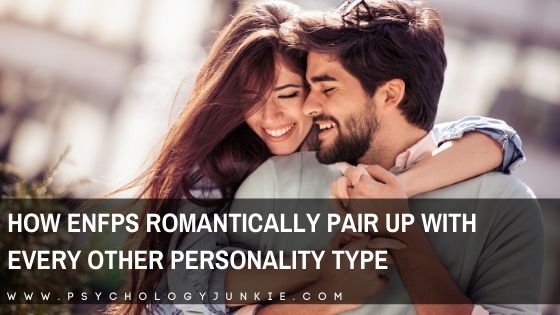
ENFPs and INFPs
Romance and imagination run deep in this passionate pairing. ENFPs and INFPs share a lot in common, but there are enough differences that there’s a sense of balance in this relationship. Both types are imaginative, passionate, and guided by their deeply-held inner values. Yet while ENFPs are propelled primarily by their sense of the potential, INFPs are propelled primarily by what they believe is right for them. INFPs will have a sense of something or someone’s ethical integrity more quickly, and ENFPs will sense something’s potential more quickly. INFPs can help ENFPs to slow down and align themselves with their values and personal feelings. ENFPs can help INFPs to explore more possibilities and dabble in new, creative experiences. Both yearn for personal growth and both types will readily understand the other’s creative process. That said, because these types are so subjective in their values and goals, there can be huge differences between them. One INFP might be passionate in defense of animal rights while another is eating a strictly Paleo diet. Some NFP couples can descend into fiery conflicts when their values are misaligned because those values are so personal and important to them.
ENFPs and INTPs
Forward-thinking and creative, these two can have a very playful, inspiring relationship. Both are drawn to discussing theoretical and global issues and both share an offbeat, irreverent sense of humor. Both are hesitant to control the other, so there’s a mutual sense of freedom and flexibility here. INTPs can help ENFPs to slow down, focus their energy, and fine-tune their ideas. ENFPs can help INTPs to get out into the world more and get in touch with their deeper desires and feelings. Unfortunately, no relationship is immune from conflict and difficulty, even this one. Both partners can reach conflict when they have to make decisions that will impact them both. ENFPs will be guided by their values while INTPs will want to break down the pros and cons impersonally. They can come to wildly different conclusions about the best way to deal with a situation and then, neither wanting to impede on the other’s freedom, can get stuck in indecision. Getting a deeper understanding of Introverted Feeling (the ENFP’s primary decision-making function) and Introverted Thinking (the INTP’s primary decision-making function) can help this relationship to be less confusing and more understanding.
ENFPs and ENFJs
Passionate and intense, this relationship is bound to be filled with inspiration but also plenty of potential conflicts. Both of these personality types are forward-thinking, inspirational, and driven by their sense of the potential. That said, even though they may feel an initial sense of camaraderie, there’s also a sense of confusion because they share none of the same primary mental processes. ENFPs perceive the world through Extraverted Intuition, and as a result are continuously generating more and more possibilities and ideas. Narrowing those possibilities down is de-motivating because they prefer to stay in a state of openness for as long as possible. ENFJs, in contrast, are driven by Introverted Intuition. Introverted Intuition discards possibilities until it settles on the one that seems most ideal or possible. The ENFJ will want to narrow down possibilities into one singular focus, while the ENFP will want to keep adding more possibilities to the agenda. This can result in both partners irritating each other inadvertently as the one seems to frustrate the other’s plans without realizing it. In the same way, these types share different decision-making processes. When ENFPs make decisions they look inside their hearts – what is right to them? What are their core desires? What are their subjective needs and values? ENFJs, in contrast, look outside themselves. What does everyone else need? What are the values of the people around them? How can consensus be reached for mutual benefit? While the ENFP wants to travel a more individualistic road, ENFJs look for win-win solutions. This can result in the ENFP feeling like the ENFJ is being too much of a people-pleaser and the ENFJ thinking the ENFP is being “selfish.” Understanding each other’s cognitive functions can help this relationship to be more understanding and fulfilling.
ENFPs and ENTJs
Intense is probably the first word I’d use to describe this relationship. Together, these two types can make astounding leaps in innovation. Both are visionary and ambitious, drawn to trailblazing new paths rather than sticking with what they know. ENFPs bring ENTJs a sense of openness, warmth, and understanding. They help them to see more possibilities and to tap into their inner values and driving motivations. ENTJs help ENFPs to refine their goals and create roadmaps for achieving their objectives. As a team they’re nearly unstoppable, and their passion is usually unstoppable as well. ENTJs need to be careful not to steamroll over the ENFPs more laid-back, flexible approach to life and ENFPs need to be careful not to misunderstand the ENTJs directness for cruelty when conflicts occur. Not naturally tactful, ENTJs can step on the ENFPs sensitivities when they blurt out criticisms quickly. ENFPs can also annoy ENTJs when they are slow to come to a decision. An understanding of personality type can really help this pair to keep the passion high but the conflict-levels low.
ENFPs and INFJs
Ideas will abound in this romantic relationship. INFJs will be drawn to the ENFPs liveliness, creativity, and passion, while ENFPs will be drawn to the INFJs imagination, focus, and warmth. There’s usually a quick spark between these two because, while they’re both very similar in some ways, they use each of their strengths in totally different ways. Both of these types are intuitive-dominant, but while ENFPs will constantly generate more ideas, INFJs will constantly be narrowing ideas down to find the best fit. ENFPs will focus on alignment with their inner values, while INFJs will be social chameleons – wearing their hearts on their sleeves and focusing on the moods and feelings of others. ENFPs can broaden the INFJs perspective on life, while INFJs can help ENFPs to narrow their focus and dig deeper into their goals. Both of these types are likely to spark brighter, more vivid insights in the other. There might be some misunderstandings and arguments because they share none of the same cognitive functions, but because of that, they can both help each other to grow in powerful ways.
ENFPs and INTJs
Although these types might seem like opposites at first glance, they are actually quite a common pairing! ENFPs are drawn to the focus and future-reaching insight of the INTJ, while INTJs are drawn to the creativity and open-mindedness of the ENFP. Both types bring a perspective to the relationship that the other is lacking, and that tends to draw them closer as time goes on. INTJs can help ENFPs to harness their ideas and bring them to fruition, while ENFPs can help INTJs to see alternatives and new angles they might have been blind to before. They just have to look out for their energy needs along the way. INTJs are constantly trying to narrow down possibilities, while ENFPs are constantly trying to generate more possibilities. This can lead to irritation and conflict over time as one partner may feel like the other is ambushing their efforts. ENFPs also crave a lot of variety and flexibility, whereas INTJs can have a very singular focus. This can lead to different lifestyle preferences – for example, the ENFP might want to be a digital nomad while the INTJ might be a homebody. You can find out a lot more about this pairing in my article, When Opposites Attract – Why ENFPs and INTJs Fall in Love
ENFPs and ESFPs
Adventurous and daring, the ENFP and ESFP couple is bound to have an exciting time together. Each of these types is drawn to possibility and novelty, and each prefers a flexible, spontaneous approach to life. Last-minute splurges to travel across the world? No problem. Someone quit their job so they could follow their real passion? Awesome! There’s a sense of freedom that each individual in this relationship gives the other. That said, no relationship is without its potential conflicts! ENFPs may find ESFPs too focused on action to imagine and dream with them. ESFPs can feel that ENFPs are too wrapped up in theories and generating “half-baked” ideas. Sometimes conversations can lull as the two types try to find similar interests to talk about. Usually, in these situations the ENFP wants to discuss something abstract and the ESFP would rather DO something. However, as these two types grow and mature they will both develop more patience with their non-preferred functions. ENFPs will have a higher tolerance for action and day-to-day discussion, and ESFPs will have a higher tolerance for abstract conversation.
ENFPs and ESTPs
This type pairing is one of the rarer combinations I’ve come across, but it can also be very successful. Both ENFPs and ESTPs have a strong sense of adventure, a great zest for life, and a desire to be flexible and spontaneous. ENFPs are drawn to the ESTPs confident, pragmatic outlook on life and ESTPs are drawn to the charisma and imagination of the ENFP. That said, there are bound to be misunderstandings in this relationship. Both of these types have completely different decision-making processes. ESTPs make decisions by weighing the pros and cons and looking for leverage-points. ENFPs make decisions by weighing their values and what they feel is personally important. ESTPs can be friendly and charismatic, but they tend to get bored with introspection or discussing theories and abstractions. ENFPs are drawn towards deep introspection and get joy from theorizing and imagining future possibilities. These two might have fun while they are engaged in an activity but feel restless when it comes time to talk about the deeper issues of their hearts. With time, understanding, and generosity, however, both types can learn to speak each other’s languages and make space for their partner’s natural preferences.
ENFPs and ISFPs
Passionate and intense, relationships between these two types are usually satisfying. ENFPs and ISFPs have enough differences to add some spark, but enough similarities to create a connection. Both types value introverted feeling, which means that when they make decisions, they will both weigh their values, ethics, and the options that best line up with what’s important to them personally. They both prioritize freedom and will give each other space to explore their own interests. They also share a sense of adventure and an exploratory, inquisitive approach to life. ISFPs are drawn to the enthusiasm and imagination of the ENFP, while ENFPs are drawn to the down-to-earth, enigmatic nature of the ISFP. Problems can occur in these relationships when they don’t see eye-to-eye on the same values. Because they are both so connected to their sense of what’s right and wrong, they can risk becoming self-righteous with each other when their views don’t align. Because of their different perceiving functions, there can also be differences in perspective. ENFPs naturally generate possibilities and alternatives on a near-constant basis, whereas ISFPs have a more defined focus. In conversations, ENFPs can jump from one theory to the next with ease, whereas ISFPs tend to dwell on real-world experiences rather than abstractions. The ENFP might see the ISFP as “unimaginative,” and the ISFP might see the ENFP as “unrealistic.” Learning about each other’s perceiving functions can help this relationship to grow with understanding. ENFPs see the world primarily through Extraverted Intuition, whereas ISFPs see the world through primarily through Extraverted Sensation.
ENFPs and ISTPs
This is a rare romantic relationship, but one that does have a lot of potential for growth. ENFPs and ISTPs are often drawn to each other simply because they are so different. Each partner senses in the other a strength that they don’t have, but would like to have. ENFPs are drawn to the ISTPs grounded, realistic nature, and ISTPs are drawn to the ENFPs visionary, enthusiastic personality. ENFPs can help ISTPs to explore new ideas, imagine new possibilities, and get in touch with what matters to them on a personal level. ISTPs can help ENFPs to notice opportunities in the present, refine their visions, and narrow down possibilities based on what is most likely to work.
While there is a tremendous potential for growth in this relationship, there is also a tremendous potential for conflict. ENFPs and ISTPs make decisions using different criteria; ENFPs value their subjective ethics and feelings about what matters to them, whereas ISTPs weigh the pros and cons, look for leverage points, and try to find out what’s verifiable. ENFPs might see ISTPs as cold in their decision-making, and ISTPs might think ENFPs are too focused on their feelings. When it comes to conversations there can also be difficulty. ENFPs enjoy dwelling on theories and “what-if” scenarios, whereas ISTPs enjoy focusing on what’s real and tangible. They can experience lulls in conversation and connection because both naturally focus on different things. ENFPs and ISTPs often have good luck when they blend their interests. For example, talking about theories and possibilities WHILE doing an activity like canoeing or hiking.
ENFPs and ESFJs
A rare romantic pairing, ENFPs and ESFJs tend to draw together more frequently as friends than as romantic partners. That said, when they do romantically pair up, there is great potential for warmth and mutual support. ENFPs can find in the ESFJ someone who tends to the practical areas of life they so often avoid. ESFJs are detail-oriented, down-to-earth, and typically generous. They enjoy taking care of the small details that make life more comfortable for everyone. In the ESFJ, the ENFP can find a sense of security and warmth that is inviting. ENFPs bring imagination, spontaneity, and novelty to the relationship. They help to break the ESFJ out of their shell and see new opportunities and original ideas. There’s a sense of fun and rebelliousness that ENFPs can bring to this romantic pairing. In mid-life, there tends to be a stronger connection between these two types. ESFJs start to develop their Intuition and so they will have more to talk about with ENFPs as they grow into that process. As ENFPs get into their 40s they will start to develop more of their Sensing side, which can cause more understanding and less friction between them and their ESFJ partner.
ENFPs and ESTJs
Opposites attract, especially when it comes to the ENFP and ESTJ relationship. At first, these two types might repel each other with their differences. ESTJs are straightforward, focused, and grounded in reality, whereas ENFPs are overflowing with imagination and varied, novel ideas. The ESTJ might feel it’s their duty to pull the ENFP “down to earth,” and the ENFP might feel like it’s their duty to show ESTJs the beauty in abstract thought. These two types risk becoming condescending with each other because they both value their way of seeing the world, seeing the other’s way as less important. ENFPs can see ESTJs as tactless and controlling, and ESTJs can see ENFPs as overly-sensitive and undependable. That said, there is still immense potential for growth and passion in this relationship. Both types NEED a little more of what the other has to offer. ENFPs can benefit from the stability and no-nonsense, logical nature of the ESTJ. ESTJs can broaden their perspectives with more imagination, flexibility, and innovation. If you’re an ENFP in this relationship, take some time to learn more about Introverted Sensation, the ESTJs perceiving process. If you’re an ESTJ in this relationship, take some time to learn more about Extraverted Intuition, the ENFP’s perceiving process.
ENFPs and ISFJs
This relationship is often filled with devotion and warmth. ENFPs are drawn to the gentle, empathetic nature of the ISFJ, and ISFJs are drawn to the liveliness and curiosity of the ENFP. Both types are very different. ENFPs are visionary extroverts who are apprehensive of routine or certainty. ISFJs are reflective, introspective types who crave stability and routine. In the ISFJ, the ENFP can find a devoted confidante – someone who will create a sense of “home” wherever they go. In the ENFP, the ISFJ finds a sense of the potential and can explore new ideas that spark their imagination. That said, this relationship isn’t the easiest pairing. ISFJs can hide their true feelings at times, opting to preserve harmony rather than “rock the boat.” Later, they can become passive-aggressive as their feelings remain suppressed. ISFJs can also resent the ENFP for not taking on their share of household duties, chores, and regular tasks that ENFPs tend to dislike. In the same way, ENFPs can feel that ISFJs hold them back, keeping them from pursuing newness or adventure. Because the ISFJ craves security and routine and ENFPs crave risk and variety they can find themselves arguing about plans for the future and lifestyle choices a great deal. It’s important for the ISFJ to give the ENFPs regular opportunities for exploration and adventure. It’s also important for ENFPs to respect the ISFJs need for stability and reliability.
ENFPs and ISTJs
Surprisingly, these two types wind up together quite frequently. In most cases, I believe it’s because ENFPs and ISTJs see in the other strengths that they lack. These types share all of the same cognitive functions, but in a completely reversed order. ENFPs are masters of imagination and innovation, but they struggle to maintain stability or tend to their physical needs. ISTJs are masters of maintaining stability and focusing on real-world details, but they can struggle to innovate or see alternatives. In the other, each partner sees a strength that doesn’t come naturally to them. This creates a spark and a sense of curiosity (or repulsion) that carries them through. Both of these types have a lot they can learn from each other, but they may also be condescending and patronizing with each other. ENFPs might see ISTJs as “dull,” or “unimaginative.” ISTJs might see ENFPs as “flighty,” or “unrealistic.” Conflicts can be heated, and both may feel misunderstood or de-valued by the other. It’s essential for these partners to take time to learn about each other’s way of thinking. ENFPs should learn about Introverted Sensation to grasp their partner’s needs more fully. ISTJs should learn about Extraverted Intuition, so they can better appreciate their partner’s perspective.
What Are Your Thoughts?
Did you enjoy this article? Do you have any wisdom or insight to share? Let us know in the comments!
Find out more about your personality type in our eBooks, Discovering You: Unlocking the Power of Personality Type, The INFJ – Understanding the Mystic, and The INFP – Understanding the Dreamer. You can also connect with me via Facebook, Instagram, or Twitter!




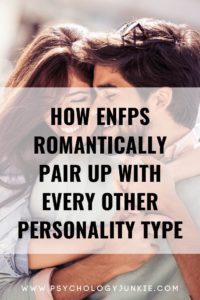


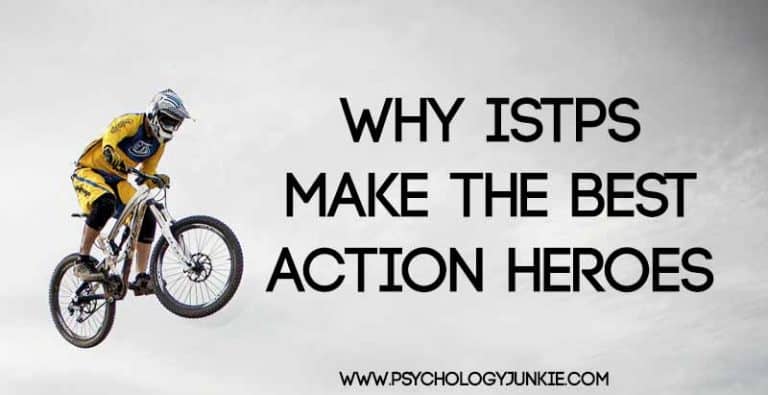
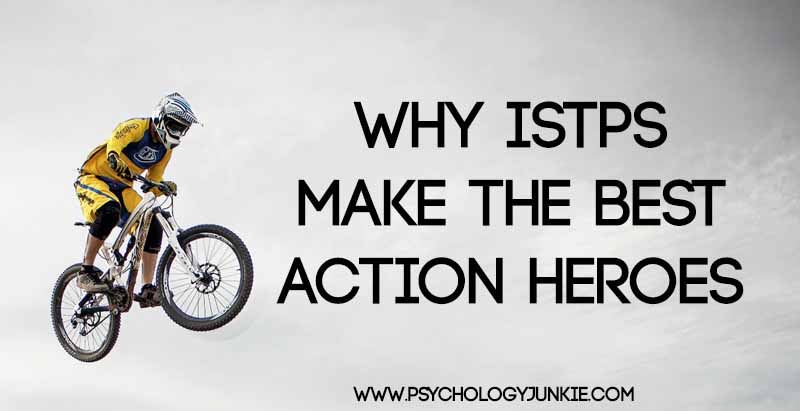
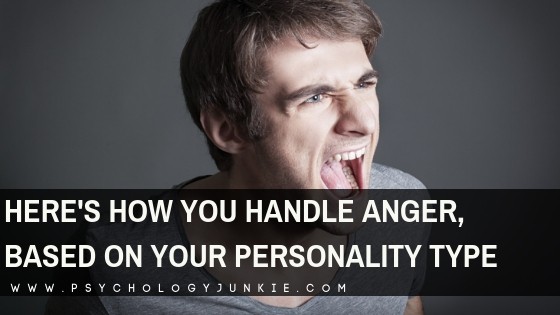


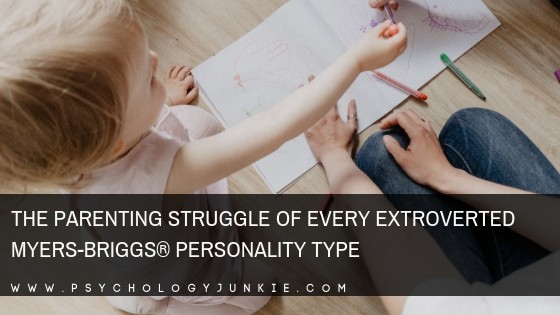


I loved this.. spot on
Thank you!!
This is very interesting, as ENFP I think you have hit the nail on the head with some aspects and I found myself understanding better why some thing did and did not work out in my past relationships.
I went on a date with an ENFJ the other day, and she was just going along with everything rather saying what she wants or wanted. It was very awkward vibe. She was just chilled and down for anything, as an ENFP it just felt a bit unreal. Also she thought I was a bit selfish for acting in way that I parked in two bays and that really annoyed her.
I also knew a ISTJ, we always argued backed and forth but when we came to an agreement we had a mutual grounds with understanding. She was dull and boring but that was not say that it didn’t work to a degree, she would always complain about me being too off the wall or flighty but eventually accepted it. Also you hit the nail on the head about ENFPs struggling to met their physical needs, its true. When I was with her she would met them, even though she got what she wanted and I always was left unsatisfied. The natural attraction was there but thats mainly because both of us were literally opposites of each other.
In my experience INFJS and ENFPs are a good paring but problems can arise quickly in the sense that INFJs dont express themselves enough at times, which leads the ENFP wondering and confused. I have a few relationships with INFJs they have be fulfilling to an extent but both being different just see things differently, I am sure how some ENFPS end up with this type long term. It is always interesting to me.
As an ENFP I also feel that many other personalities feel threatened by us because we are so hard to keep up most of the time. We are just naturally aloof and do not try to be, but are. ENFPs in context to get along, will from my experience with everyone and other types. I feel like most other types outside of INFP and ENFP dont really get us..
I’m an ENFP female. My best friend of 10 years is an INFJ. She is my confidante. I really like the INFJ personality type and I will marry an INFJ male in the future. It’s INFJ or no one.
I really dislike the thinking types. They’re insensitive and I will have a hard time getting along with one.
I also just celebrated 10 years of being friends with my INFJ friend. We went to an escape room and then dinner with a small group of close friends. I surprised her with a basket of random stuff and her reaction was so wholesome.
As for thinking types at times I do think they can be cocky I have grown up being surrounded by them so do not mind and they can be emotional as well just give them your patients but I have not dated one so take that with a grain of salt.
For dating, I’m dating an ISFJ and plan on moving in with them next year so we will see how that goes lol.
I still got a lot to learn as I am very young. I’m 19.
Most of my closest friends are INFPs, though I find I vibe with P’s in general fairly well. Overall I’ve found that INFPs and ENFPs seem to “get” me the most. I tend to get along far better with P types, as often J types (nothing against them) feel a bit too rigid and constrained and judgmental to get very close to since I am very much a free spirit. Having said that, I do have one close friend who is an ENFJ – he’s a very chill and non-judgmental one who makes me feel relaxed and comfortable. I love finding out what someone’s personality type is, It gives so many insights into who they are!